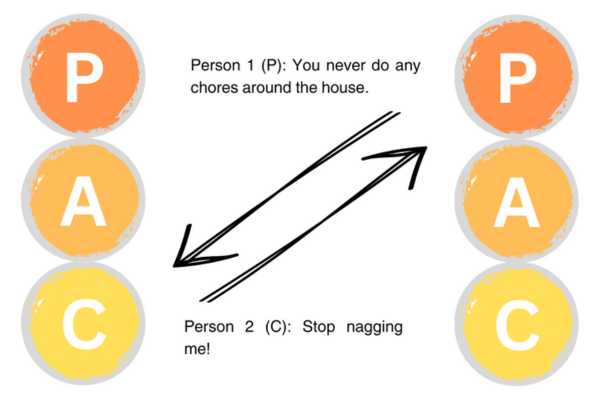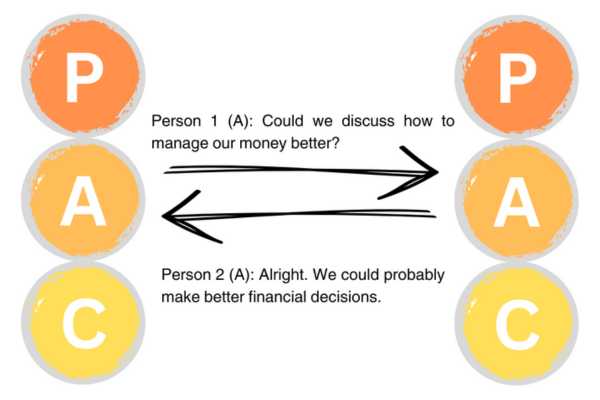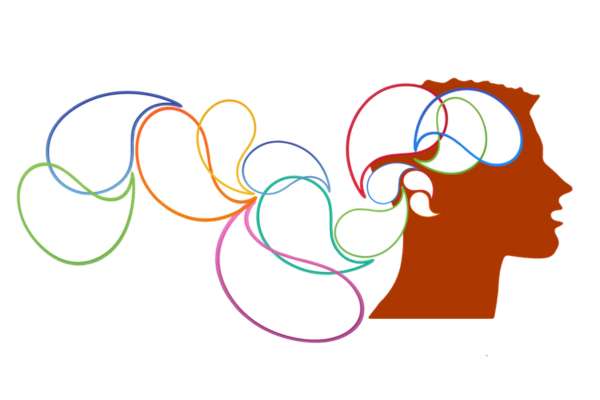Healthy communication is central to any successful relationship. Transactional Analysis (TA) offers a powerful framework for understanding and improving communication patterns. Here, we’ll look at a fictional couple to see how TA principles can be applied for better communication.
Amy and Tony are a married couple. However, they frequently find themselves in conflict at home. Amy constantly nags Tony about household chores. Tony then gets defensive and responds by protesting, rolling his eyes and muttering under his breath.
Amy : “You never do any chores around the house!”
Tony: “Just stop nagging me!”
Identify Ego States and understand Transactional Patterns
The first step in applying TA to your relationship is recognizing which ego state (Parent, Adult, or Child) you are operating from (see link to previous article for an overview on the TA framework). Identifying these ego states provides insight into the underlying emotions, intentions, and behaviours behind interactions.
In this example, we see that Amy tends to communicate from a Parent ego state (Critical Parent), when she lectures Tony about household chores. Tony often gets defensive and responds from a Child ego state (Rebellious Child).
Recognising such patterns helps to break the cycle of negative interactions. In this case, Amy and Tony are perpetuating a parent-child dynamic in their relationship instead of an adult-adult dynamic.
Once you understand the roles, you can judge whether this makes your interaction a complementary or crossed transaction. You can then determine whether there’s a risk that you’re leading each other in the wrong direction (Child-Child complementary transactions) or responding inappropriately (when you’re being a Child, or even a Parent, in a crossed transaction). When you pay extra attention to what you say, you’re better able to respond as an Adult.
By becoming more aware of each one’s ego states, triggers and emotional responses, Amy and Tony can consciously choose to respond from an Adult ego state instead of reacting emotionally.
With the guidance of a therapist or through self-reflection, couples can make new decisions about their behaviors.
For example, Amy and Tony can decide to approach household chores as a shared responsibility, reducing the emotional charge associated with this task. These decisions reflect their growing autonomy as they consciously choose their responses rather than reacting out of habit.
Communicating from an Adult ego state
Shift your interaction by using “I” statements and active listening. For instance, Amy can express her concerns without blaming, and Tony can respond by addressing the issue constructively. This allows both partners to express their needs and desires without feeling criticized or defensive. By speaking from their Adult ego state, Amy and Tony can engage in a more rational, balanced, and respectful manner.
Let’s see how this new approach might work in a disagreement:
Scenario 1 (Typical Interaction):
- Amy (Critical Parent): “You’re always spending money on unnecessary things!”
- Tony (Rebellious Child): “Stop nagging me! It’s my money. I’ll spend it however I want!”
Scenario 2 (New Approach):
- Amy (Adult): “With the economy this way, I would feel better if we could save more. Could we discuss how to manage our money better?”
- Tony (Attempting Adult): “Alright. We could probably make better financial decisions, but I do want some flexibility for personal spending.”
In this new approach, Amy initiates their conversation in a collaborative manner. Because she comes across as less confrontational, Tony is able to express his perspective without feeling attacked.
The next time you and your partner find yourselves in a negative interaction, take time to pause a heated argument, especially if you recognise a “Parent” and “Child” interaction going on. If needed, take a break to cool off and return to the discussion when you are more calm and practice speaking from an “Adult” state. This allows you both to express how you feel without assigning blame.
Exploring Life Scripts
Life scripts are unconscious decisions made in early childhood as a result of the perception and interpretation of parental messages about one’s self, others, and the world (Berne, 1972). Understanding you and your partner’s life scripts can help give perspective to the origin of certain behaviours.
In the case of Amy and Tony, we discover that Amy was the only girl in her family and was often made to be responsible for her younger brothers. As a result, Amy tends to tell Tony what to do. If she perceives that Tony is acting in an irresponsible way, it triggers strong emotions in her.
Tony, on the other hand, was often criticised by his mother growing up. Nothing he did was ever good enough and he could never meet her expectations. As a result, Tony tends to rebel strongly if he perceives Amy trying to lecture or control his behaviour.
Knowing this, we can see how situations that trigger Amy and Tony’s respective life scripts about responsibility and criticism can create a negative dynamic in their interactions. Examples of life scripts can be: “I have to be perfect”, “I have to please others”, “I’m not important”, or “Don’t feel”. As you reflect on common themes that come up for you and your partner in conflict, what life scripts can you identify? Seeking the help of a trained professional can help to identify and process the life scripts and dynamics behind your interactions.
Game Analysis
Berne’s (1968) defined a game as: “An ongoing series of complementary ulterior transactions progressing to a well-defined, predictable outcome.”
“Games” refer to human transactions that are predictable, have a hidden motive and a payoff of some kind for one or more parties in the game (such as sympathy or admiration).
Many relationships involve recurring “games” which people often engage in unconsciously but often lead to negative outcomes. There are many different types of games that people engage in. You can find more examples in Dr Berne’s book “Games People Play.”
In the case of Amy and Tony, they find themselves stuck playing the “I’m Only Trying to Help You” and “See What You Made Me Do” (SWYMD) game.
Amy offers unsolicited advice to Tony from a Critical Parent state, believing she knows what is best (“I’m Only Trying to Help You”). Tony, feeling smothered and controlled, reacts in a Rebellious Child state. If he loses his temper at Amy and acts out by throwing things around the house, he can justify this behaviour by blaming Amy, playing the “See What You Made Me Do” (SWYMD) game.
It’s important to recognize when someone else is playing a game. Identifying such games and refusing to play them is a way to separate yourself from unpleasant consequences. It also establishes you in the role of a rational Adult.
Conclusion
Applying Transactional Analysis to your relationship can be transformative, fostering better communication and personal autonomy. It offers a structured approach to understand and improve your communication patterns, leading to healthier interactions and a deeper connection with your partner. By recognizing ego states, transactional patterns, and life scripts, and by consciously choosing to interact from an Adult ego state, you can change the way you relate to each other. Ultimately, this creates a more loving and fulfilling partnership built on open communication and mutual respect for each other’s autonomy. It takes time and effort, but the results are well worth it.
References:
Berne, E. (1968). Games People Play. London: Penguin UK.
Berne, E. (1972). What Do You Say After You Say Hello? New York: Grove Press.
https://medium.com/romasharma/life-script-the-end-is-written-in-the-beginning-4c0074e8cf2a
https://www.mindtools.com/ayjtd4p/transactional-analysis














